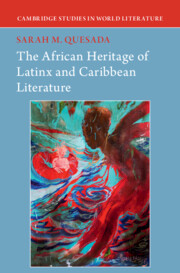Book contents
- The African Heritage of Latinx and Caribbean Literature
- Cambridge Studies in World Literature
- The African Heritage of Latinx and Caribbean Literature
- Copyright page
- Contents
- Illustrations
- Acknowledgments
- Introduction Textual Memorials of a Latin-African Literature
- Chapter 1 Fear
- Chapter 2 Commodification
- Chapter 3 Obliteration
- Chapter 4 Archival Distortion
- Coda
- Notes
- Bibliography
- Index
Introduction - Textual Memorials of a Latin-African Literature
Published online by Cambridge University Press: 14 July 2022
- The African Heritage of Latinx and Caribbean Literature
- Cambridge Studies in World Literature
- The African Heritage of Latinx and Caribbean Literature
- Copyright page
- Contents
- Illustrations
- Acknowledgments
- Introduction Textual Memorials of a Latin-African Literature
- Chapter 1 Fear
- Chapter 2 Commodification
- Chapter 3 Obliteration
- Chapter 4 Archival Distortion
- Coda
- Notes
- Bibliography
- Index
Summary
The introduction explains the premise of a buried Latin-African history in mainly Junot Díaz, Achy Obejas, Gabriel García Márquez, Tomás Rivera, and Rudolfo Anaya, as well as other Caribbean and African texts. The introduction briefly addresses Díaz’s resurrection of zombies in Benin, Obejas’s critique of African exoticism in Cuba, García Márquez’s Angola writing, Rivera’s problematic Congo, and African sources in Anaya. Drawing from multilingual archives about Africa and Slave Route fieldwork, I elucidate how the legacies of colonialism and imperialism have reproduced, in Africa, antiblack discourses that stymie African historiography in literature. Four chapters revisit discourses that render Africa fearful, commodify it, obliterate its history or distort it. These chapters also evince four main eras in African history: the Slave Trade, the 19th century “scramble for Africa,” the decolonizing wars, and the neoliberal turn. As these African sites of memory become embedded in narrative, the introduction theorizes the function of narrative as “textual memorials” akin to the UNESCO Slave Route. These memorials potentialize a revisiting of Latin-African memory. Paired with African narrative, the selection of post-1970s texts in this book evinces a Latin-African literature that challenges normative formulations in World Literature, transatlantic studies, and even the notion of Latinidad.
- Type
- Chapter
- Information
- Publisher: Cambridge University PressPrint publication year: 2022



